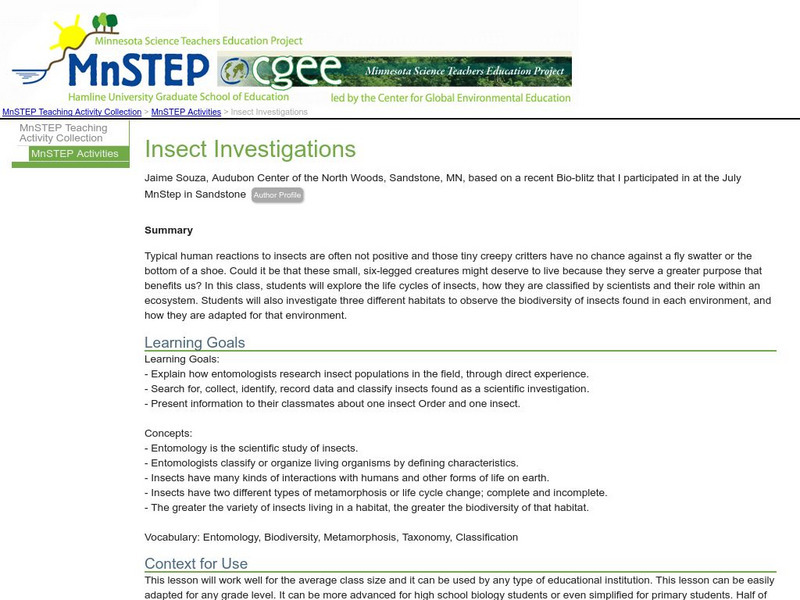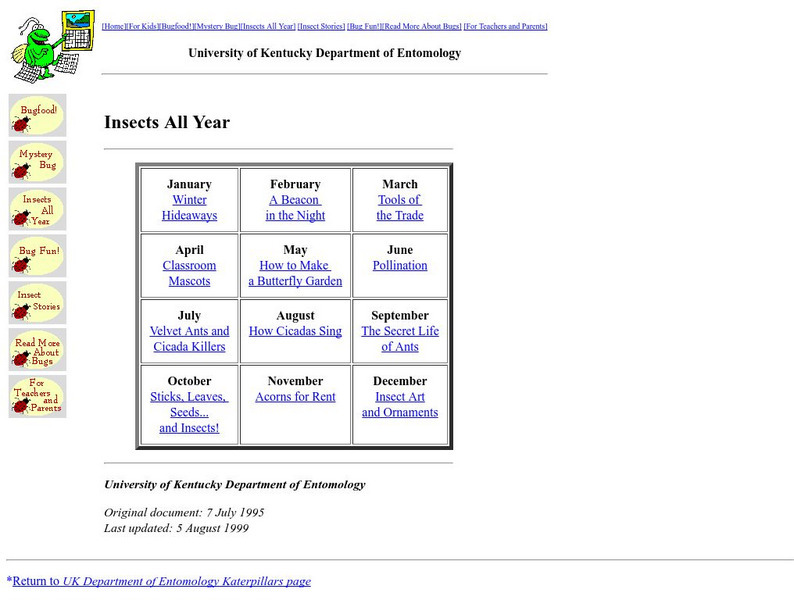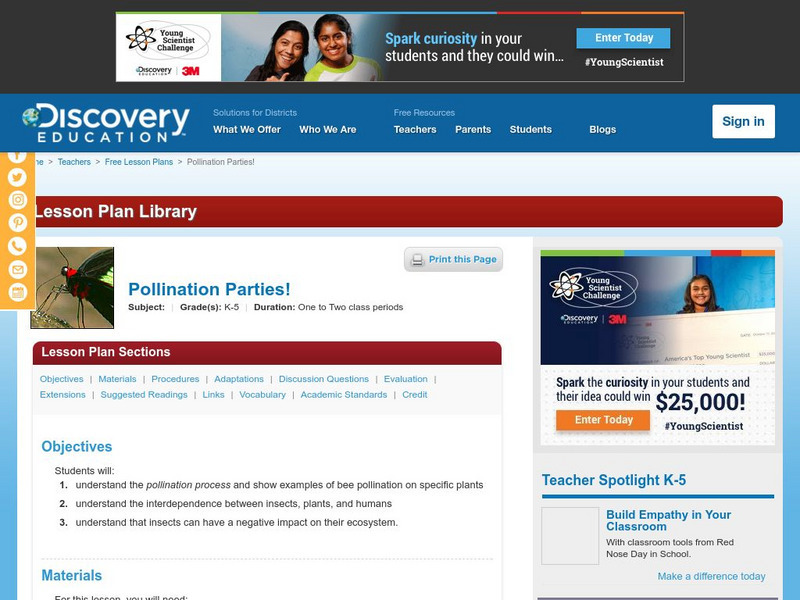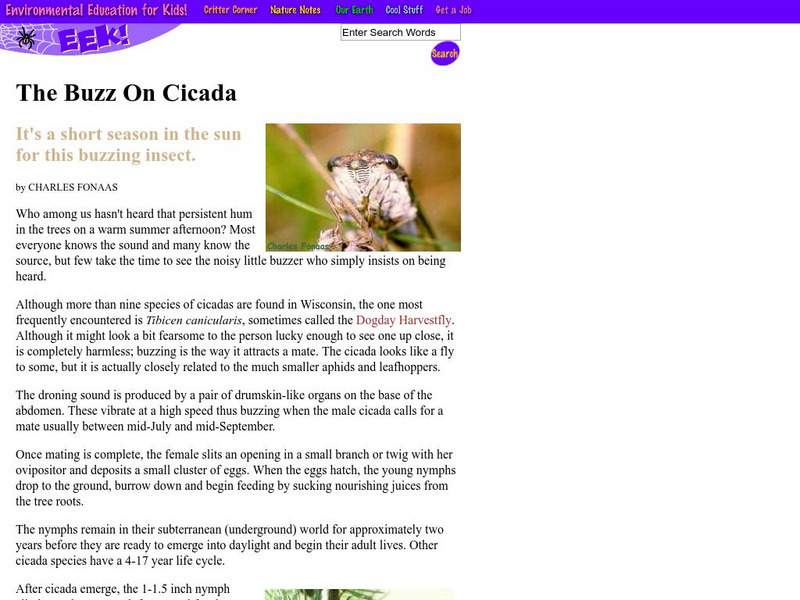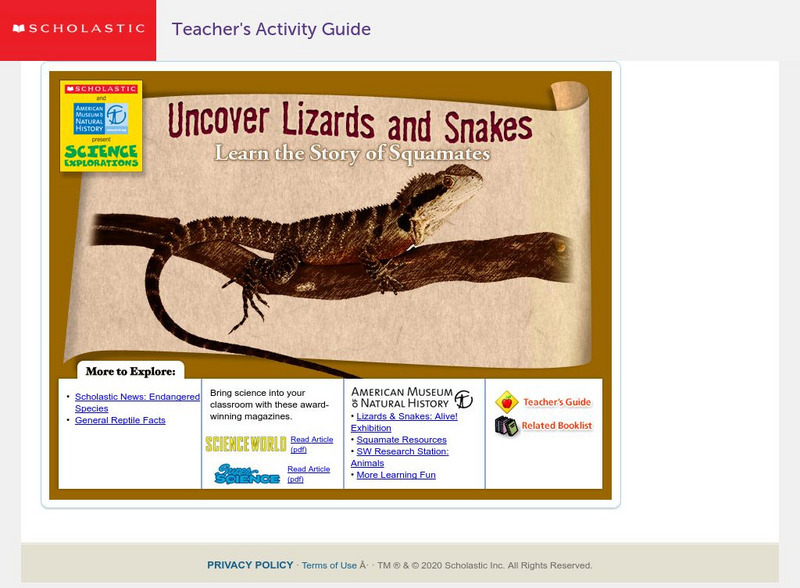Curated OER
Great River Bend Adventure
Students use their imagination. They discuss the 4 C's of teamwork: Concentration, Communications, Coomperation, and Consideration. Students discuss the safety guidelines of the project. They complete a rope maze. The group walks...
Curated OER
Barn Owl
In this barn owl worksheet, students read four paragraphs of information about barn owls, and study a photograph. There are no questions here.
Curated OER
Worksheet 4 Word Search: Verbs
In this verbs word search worksheet, students read five clues. Students decide what verbs match the clues and find them in a word search puzzle.
Curated OER
Missing Macroinvertebrates
Students investigate the concept of a macroinvertebrate. They observe the presence of increases or decreases in population in order to test for factors that contribute to the extinction of a species. Students predict the likelihood of...
Texas A&M University
Texas A&m: Adding Adaptations to Insects
A lesson plan site that illustrates how certain adaptations will enhance an insects chances for survival.
Smithsonian Institution
Smithsonian Learning Lab: The Greatest Show on Earth (Starring Some of the World's Smallest Animals)
Teachers can download this teaching package that discusses insects and insect adaptations. Students will enjoy the hands-on activities described in the lessons. Teachers will appreciate the student handouts provided, as well as the list...
CK-12 Foundation
Ck 12: Life Science: Insect Food
[Free Registration/Login may be required to access all resource tools.] Insects have different types of appendages adapted for capturing and feeding on prey. They also have special senses that help them detect prey. Furthermore, insects...
Science Education Resource Center at Carleton College
Serc: Insect Investigations
In this instructional activity, learners will explore the life cycles of insects, how they are classified by Entomologists and their role within an ecosystem. Students will also investigate different habitats to observe the biodiversity...
University of Kentucky
University of Kentucky: Insects All Year
The University of Kentucky provides information and activities about insects for each month of the year. Projects include art and observational activities.
Discovery Education
Discovery Education: Pollination Parties
This lesson helps students understand the concept of pollination. Objectives, materials, procedures, adaptations, discussion questions, evaluation, extensions, suggested readings, links, vocabulary, and academic standards are all included!
TED Talks
Ted: Ted Ed: The Sexual Deception of Orchids
Anne Gaskett dives into the surprisingly complex ways orchids attract insects.
PBS
Pbs Teachers:my Life as an Insect in Namib
Identify the harsh characteristics of the Namib Desert and determine the adaptations an insect in Namib Desert must have to survive.
Environmental Education for Kids
Eek!: Cicada
This site provides a brief but concise description of this interesting insect. Grades 4-8.
Utah Education Network
Uen: Life's Different Seasons
Recognize changes in bears and insects and compare them.
University of Kentucky
University of Kentucky: Bug Fun
This fun site is designed for teachers who want to have interactive fun in the classroom. "Several articles give resources and basic information about insects and their relatives while others outline activities with different insect...
PBS
Pbs Teachers: Scientific American: Wild Places: Identifying Species
Sort and classify insects and spiders by characteristics, using stamps from the United States postal stamp Classic Collection. Create a taxonomic key to distinguish between any four animals.
Open Door Team
Open Door Web Site: Movement in the Air
A site on how birds fly discusses their anatomy that allows them to fly. Also discusses the role that feathers play in flight. Also includes a section which discusses other insects that fly.
Scholastic
Scholastic: Science Explorations: Uncover Lizards and Snakes
An exploration of squamates, or scaled reptiles. Take notes about lizards and snakes using the pdf "Squamate Chart" while viewing a slideshow, investigate the squamate anatomy and how squamates differ from other animals, such as insects...
Alabama Learning Exchange
Alex: Little River Canyon's Carnivorous Green Pitcher Plants
A digital slide program introduces the Green Pitcher Plant (Sarracenia oreophila) to the learners. Students use a model of the Green Pitcher Plant and plastic insects to role play. They will tell the story of habitat adaptation and...
Ed Koday
Web Archive: Beetles
Beetles might be the most successful creatures on earth! Their incredible ability to adapt to any environment makes sure that they will exist, probably long after humans have disappeared from earth. One of the most important features of...
University of Southern California
Structure of Matter: Animals
A slide show that demonstrates the development of physical structure in the animal world, moving from sponges through mammals.
PBS
Pbs Teachers: Flying High: Taking to the Air
Explore the science of surface tension, the evolution of flight in insects and insects' anatomical adaptations. Construct insect models that illustrate the action of these adaptations and calculate the force per unit area of water surface.
Other
Batesian and Mullerian Mimicry
Describes how and why mimicry is exhibited by some insects. It also tells the advantages of such an adaptation as well as describes the various types of mimicry which may in fact be exhibited.







